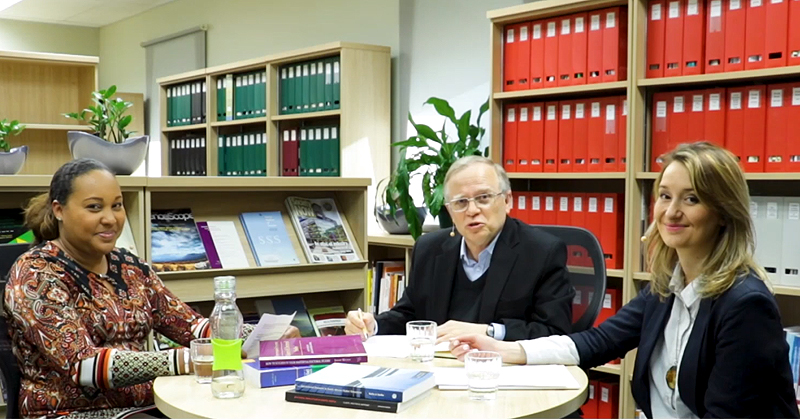9 October 2018
The DIES/CREST online Course for Supervisors of Doctoral Candidates at African Universities – the first course of its kind in Africa – has attracted a diverse group of participants from across Africa. The course kicks off on Monday 15 October 2018 and will run for eight weeks.
The 161 participants come from 25 countries across the continent, with the largest proportions from Kenya (30), South Africa (24), Nigeria (18), Zimbabwe (14), Uganda (13), Ethiopia (12), Cameroon (6), Mauritius (6) and Ghana (6). Participants are well distributed across a wide range of study fields: social sciences, humanities and arts (29,2%), agricultural and natural sciences (25,5%), economic and management sciences (16,8%), health sciences (14,3%) and engineering, mathematical and computer sciences (14,3%). The gender split of participants is 37% female and 63% male.
This doctoral supervision course was made possible via a sponsorship from the Dialogue on Innovative Higher Education Strategies Programme (DIES), funded by the German Federal Ministry of Economic Cooperation and Development and coordinated jointly by the German Academic Exchange Service (DAAD) and the German Rectors’ Conference (HRK). The course presenters are Professors Jan Botha (CREST), Chrissie Boughey (CHERTL), Liezel Frick (CHAE), Johann Mouton (CREST) and Sioux McKenna (CHERTL).
Background to the course
This course has its origins at a seminar on “Quality Doctoral Education – a Prerequisite for Strong Universities in Africa” which was held in September 2016 in Nairobi. The seminar was sponsored by the Dialogue on Innovative Higher Education Strategies (DIES) Programme (a joint venture by the German Academic Exchange Service (DAAD) and the German Rectors’ Conference (HRK). The seminar was organised in collaboration with the Inter-University Council of East Africa (IUCEA) under leadership of Prof Mike Kuria, and Kenya’s Commission for University Education (CUE). The director of CREST, Prof Johann Mouton, was the keynote speaker at this seminar. He emphasised the need for well-prepared doctoral supervisors at African universities, in particular given the rapid increase in the number of doctoral enrolments in recent years. The delegates at the workshop agreed that one of the most important elements to strengthen doctoral education in Africa was to foster the capacity of doctoral supervisors. Mr Michael Hörig, Head of the Division for Strategic Planning at the DAAD, then took the lead to organise a DIES Expert Workshop March 2017 in Cape Town where the planning for the course was done. In November 2017, the DAAD published a call to providers to apply for a competitive grant to the amount of EUR300 00 for the development and implementation of a “DIES Online Training Course for supervisors of doctoral candidates at African Universities (2018–2020)”.
In CREST’s application for the grant, we formulated the need for such a course as follows: “Due to the rapid increase in doctoral enrolments at African universities in recent years there is a dire need for more well-prepared supervisors at African universities. There are various reasons for the increase in doctoral enrolments, including the need for more qualified academic staff at African universities as well as the need for more African scholars and scientists to contribute to knowledge production in Africa to contribute to innovation and development and to enhance Africa’s participation in the knowledge economy.” The overarching goal of the course is “to enhance the knowledge production conditions and environment at African universities through online training of doctoral supervisors”.
In April 2018 CREST was informed that our application was successful. Since then the team, under leadership of professor Jan Botha, has worked hard to develop the course so that it could be ready for the first offering in October-December 2018. Professors Chrissie Boughey and Sioux McKenna from Centre for Higher Education Research and Teaching and Learning (CHERTL), at Rhodes University, and Prof Liezel Frick of the Centre for Higher and Adult Education (CHAE), at Stellenbosch University, accepted CREST’s invitation to partner with us in the development and offering of the Course. To present a course successfully online requires a reliable and stable Learning Management System (LMS) but also high levels of technical expertise. The team dedicated to this course at the Centre for Learning Technologies (CLT) at SU under leadership of Miné de Klerk plays an indispensable role in this regard.
Our identification of the need for training opportunities for doctoral supervisors as African universities was proven accurately when CREST received more than 500 expressions of interest within a month after the course was advertised. We admitted 161 participants to the first offering of the course, commencing on 15 October 2018. Only candidates in possession of doctoral degrees who are responsible for doctoral supervision at a university in Africa are eligible.
Professor Jan Botha (middle) discussing the online course in doctoral supervision with Dr Lindy Rose (Plant Pathology) and Miné de Klerk (Centre for Teaching and Learning). This video discussion forms part of the course introduction and orientation.
Professor Jan Botha sees the impact of the course as follows: “that there will be more and better prepared doctoral supervisors at African universities and through their work more doctoral students are supervised and the quality of supervision is enhanced, therefore there are more well-trained PhD graduates to participate in knowledge production in Africa and Africa’s participation in the knowledge economy is enhanced.”



